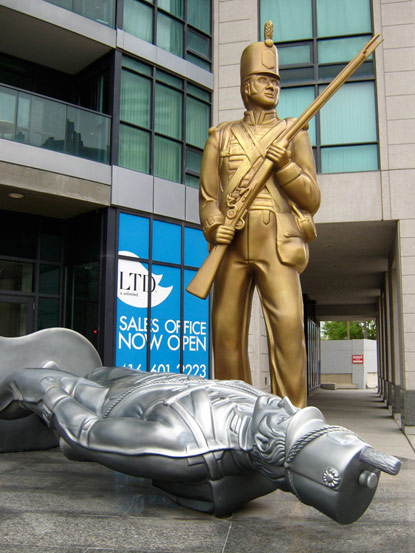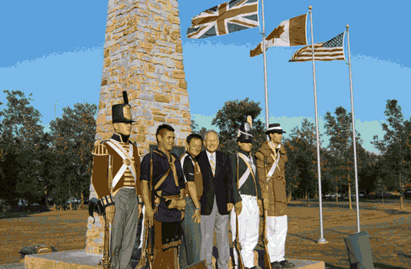The centennial of the War of 1812 was celebrated vehemently in Canada with patriotic speeches, celebrations, and the unveiling of memorial tributes. It was a last opportunity for simple celebrations of the past, as great transformation was about to take place.
For Canada, the bicentennial of the War of 1812 will not be so much a celebration of victory over their neighbours as a celebration of an important milestone that ensured the independent destiny of their nation on the North American continent.
A Clear Victor Proclaimed

Courtesy Heather M. Cuthill
One of the largest events of the centennial was the unveiling of the monument commemorating the 1813 battle of Stoney Creek near Hamilton, Ontario. Placed midway up the Niagara escarpment, this 100-foot-high tower was officially dedicated on June 6, 1913, the 100th anniversary of the battle, in the presence of a crowd of 15,000 persons including hundreds of schoolchildren, boy scouts, girl guides, and four militia regiments. The spectators watched and cheered as, initiated by a telegraphic signal keyed by Queen Mary in Buckingham Palace, 3,500 miles away, a white veil fell from the tower, the Union Jack was mechanically raised on a hoist on its roof, as massed bands played “God Save the King,” “Rule Britannia,” and “The Maple Leaf Forever.”
Unfortunately, not many months later, a Serbian nationalist assassinated an Austro-Hungarian archduke to begin the train of events that led to the horrors of the First World War. Canada suffered about a quarter of a million men and women killed or wounded in “the war to end all wars”—about two-thirds the number of casualties of the United States, but from a population one-tenth as large. The Second World War and the Korean conflict followed, and memory of the by-now-distant War of 1812 dimmed as commemoration and memorialization were devoted to more recent conflicts.
That it did not disappear entirely is due to the creation of professional federal and provincial heritage organizations that resulted in the acquisition, restoration, and preservation of historic buildings and sites related to the conflict. For example, on the Canadian side of the 35-mile-long Niagara River, there are no fewer than two forts, a dozen or so lesser structures, and four major battlefields preserved from the war. In recent decades the advent of the hobby of historical re-enactment has also kept Canadians aware of the war.
The Emphasis Shifts to Peace

Niagara Falls (Ontario) Public Library
But gone is the patriotic jingoism of a century ago. Since Britain, Canada, and the United States were allies in almost all the major wars of the violent 1900s, some find it embarrassing to refer to an unhappy time when they fought against each other. This was on the mind of one speaker at the dedication of the memorial at the battlefield of Chippawa (Chippewa in the United States) held in October 2001—a month after the attack on the World Trade Center—who reminded his audience that 1814:
was the last year that Americans, British and Canadian soldiers fought against each other—our three nations have been firm friends and allies since that time and it is ironic that we are met here today to dedicate a memorial to a long-ago battle involving these three nations and the peace between them that has endured since that time when, as I speak, American, British and Canadian soldiers are engaged in a new conflict against a relentless and implacable foe.
A decade later, unfortunately, that conflict is still with us.
Historical anniversaries are an important part of how any nation marks its progress and defines its goals for the future. For Canada, the bicentennial of the War of 1812 will not be so much a celebration of victory (for Canadians remain convinced they won the conflict) over their neighbours as a celebration of an important milestone that ensured the independent destiny of their nation on the North American continent.
Part of a series of articles titled The War of 1812 in Canadian Memory .
Last updated: August 15, 2017
